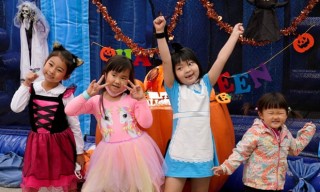Loading
Search
▼ Japanese Website Maps Neighbourhoods That Have Noisy Children
- Category:Other
Gossiping adults and boisterous children are identified on the Dorozoku map, which has struck a chord in a country known for its quiet
Chatty neighbours and children letting off steam on the street have become the target of a controversial website in Japan that identifies neighbourhoods where noise levels may be too much for those in search of a quieter life.
The Dorozoku (street tribe) map is ablaze with colourful circles indicating places to avoid because, it says, they reverberate to the sound of children at play and adults gossiping within earshot of their neighbours.
The site appears to have struck a chord in a country where even packed commuter trains are often oases of quietude, with information about almost 6,000 hotspots across Japan posted by irritable locals.
Clicking on the icons reveals the nature of the nuisance, from children “playing noisily with balls” to adults engaging in marathon gossip sessions.
“Primary school children are always playing and romping around the street, causing trouble to people living nearby,” reads a typical submission, while another user complains of having to dodge children while driving in the neighbourhood.
Older schoolchildren are not the only group being singled out, with other gripes directed at crying babies and kindergarten pupils raising their voices in the evening and during weekends.
But the site’s operator, a man in his 40s who asked not to be named, is now under fire himself, accused of fomenting intolerance of children who are only doing what comes naturally, and in a country that needs many more young people if its economy is to survive in the coming decades.
While some parents of young children said the site, which also pinpoints more tolerant locales, has helped them chose where to live, others were dismayed to find themselves listed even though they were model neighbours.
They include a care facility for children in Tokyo that reverberates to the din of their high-pitched tones, according to the Asahi Shimbun. “I didn’t know we were on the site,” a person connected to the facility told the newspaper, adding that it had been open for more than five years without a single complaint.
The site’s operator defended the service against charges of encouraging neighbourhood disputes over children who should be seen but not heard.
“I know some people will probably see the map as unfairly exposing them,” he said. “But it’s also a fact that many people are constantly troubled by noise and other issues.”
Noise appears to have worsened during the coronavirus pandemic, which has seen record numbers of people working from home and, during the first state of emergency last year, resulted in the closure of schools.
The stress caused by the virus could be turning otherwise easy-going people into curmudgeons when it comes to protecting their peace and tranquility, according to Norihisa Hashimoto, a professor emeritus of acoustic environment engineering at the Hachinohe Institute of Technology in north-east Japan.
“Those who post comments on the website should be tolerant and calmly rethink if other people’s behaviour can really be deemed as a nuisance,” Hashimoto told the Asahi, although he advised parents and guardians to ensure their children did not overdo it when playing in the fresh air.
The debate over what constitutes an aural nuisance gained attention in 2014 when authorities in Tokyo said the sound of children playing could no longer be considered a form of noise pollution.
The move was an attempt to remove legal barriers to building more childcare centres for the tens of thousands of children then on waiting lists, allow their parents to work and, in the long run, encourage couples to have bigger families and address Japan’s low birth rate.
The decision came after a slew of complaints about the noise made by children playing and attempts to prevent the construction of daycare centres and nurseries.
In 2012, residents in Nerima ward in Tokyo filed a damages suit demanding that a daycare centre rein in its noisy children. The complainants cited a bylaw applying to the outskirts of Tokyo that bans noises exceeding 45 decibels – just slightly louder than the average library - including those generated by cacophonous kids.
The bylaw was later amended to exempt younger children, and encourages residents to avoid legal action and talk through their disputes – preferably without raising their voices.
- February 19, 2021
- Comment (0)
- Trackback(0)


